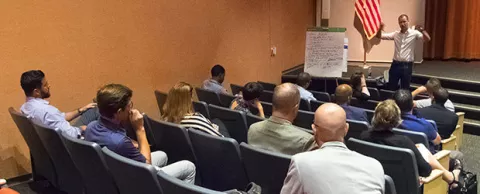
We launched our Smart Cities Council Readiness Challenge a year ago to identify cities that were ready to take action on their smart cities visions, offering them knowledge, mentoring and products and services to help them speed their efforts. After reviewing very impressive, detailed applications, today we announce our finalists for this year’s program.
As you read about the finalists and their efforts below, it’s inspiring to see such promising efforts in communities of all sizes, from cities to counties to states. We are thrilled to see such a diverse set of candidates committed to making their communities more livable, workable and sustainable. They have already made substantial progress in developing their visions, and we are excited about working hands-on with them to bring those visions to life.
Special humanitarian grant for Puerto Rico
We are also announcing today that we are expanding this year’s program to offer early support to Puerto Rico, ravaged by a devastating hurricane last year. Puerto Rico delivered a strong application that focused on ‘building back better,’ but based on its urgent need to rebuild, we aren’t waiting. The Council will help Puerto Rico develop a Readiness Roadmap, starting with a Readiness Workshop in San Juan in March.
We will announce the winners of the five original grants in March. — Jesse Berst
The following cities, counties and states are finalists for the five winning slots:
Albuquerque, New Mexico
Albuquerque is on its way to becoming a cutting-edge digital city, with the goal of creating a single, one-stop portal for electronic payments and business interactions. The city is also determined to reduce crime by supplying police with the latest crime-fighting technology.
Aurora, Illinois
Aurora already has numerous digital tools for citizen engagement. Now it hopes to construct an Open Data portal to further its goal of an efficient, transparent government that uses data-driven decision making.
Birmingham, Alabama
Birmingham is focused on social equity, economic competitiveness, and environmental sustainability. The city is implementing a project database and other ways to help the city's departments find synergies – ways to share infrastructure, share costs, and share data.
Cary, North Carolina
This town of about 170,000 is already underway with its initiatives such as the Garage for Innovation, the Innovation Analytics Lab, the Simulated Smart City Project and the One Cary platform. That platform will share data between departments, provide better insights, and give citizens digital access to services and information.
Fairfax County, Virginia
Fairfax County is diligently working on a countywide smart city strategy to "transcend silos and connect our strategic initiatives." The county has already established several transformative programs – creating cross-departmental teams to achieve goals and uniting the public, private, philanthropic and academic sectors. The goal of its e-Gov initiative is to have a “government without walls, doors, or clocks.”
Los Angeles, California
Los Angeles is developing a cross-departmental Citywide Technology Plan to drive smart city innovations throughout the city. For instance, many of its resources are built to be accessible to all departments and, in some cases, to all citizens. The city's commitment to smart technologies is illustrated by the Mayor's $1 million Innovation Fund, which provides financial support to ideas proposed by city employees.
Las Vegas, Nevada
Las Vegas is committed to being a model smart city and is developing detailed plans to build a core platform, to attract capital and talent, and to implement projects that solve social and environmental problems. In particular, the city is working on a municipal fiber network as well as an Innovation Lab to support technology pioneers.
Louisville-Jefferson County, Kentucky
Louisville Metro has been on the "smart" path for many years. For instance, it was one of the first cities to appoint a Chief Innovation Officer. Since 2011, its LouiStat program has worked to bring data-driven decision making to the entire county. And it is working diligently to connect more homes and businesses with ultra-high-speed Internet.
Virginia
This forward-thinking state has formed a smart cities working group to equip Virginia’s communities with the resources, support, and tools to become smart and sustainable. One initiative seeks to combine federal, state, city and private data into a single analytic framework – an open innovation platform that all cities can access with the state providing technical support, best practices and easy onboarding.



